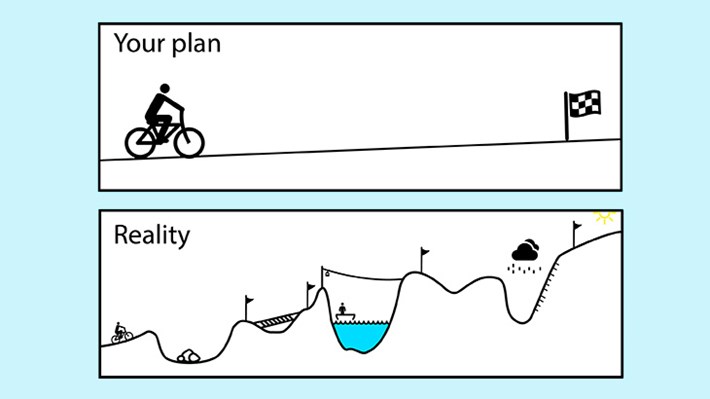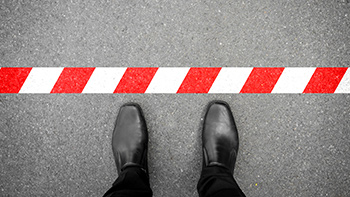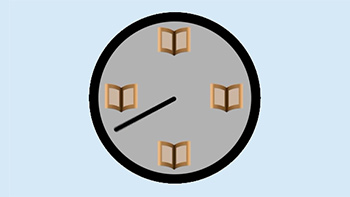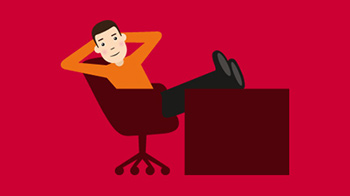
Does this look familiar? Every person will encounter situations that are not as expected or hoped. That's completely normal; real life is more complicated than what you had in mind. Experiencing stress from time to time is not weird or worrisome. However, do you have any physical symptoms? Do you feel weary, and think that you are not performing to the best of your ability? Maybe there’s more to it…
Talk about it!
If you are stressed too much or too long, it’s important to go about things differently and talk to someone. To this end, you can visit the student counsellor. The student counsellor can discuss strategies to reduce stress, or assess whether you need extra services, such as extra guidance for planning time, or introduction to a peer coach.
Tips on how to calm down
Breathe

Breathing is the primary and fastest way to reduce stress. By breathing in a certain way, you will notice that you will feel less stressed. Watch this short exercise of only one minute and join in!
You can do this anywhere and anytime. It does not take much time.
Be active

Stress produces adrenaline and cortisol, which makes you feel restless, sometimes also heated, irritated, afraid or down. Go for a walk, bike ride or start exercising, which will help decrease most of the restlessness and stress. Start exercising calmly, so do not immediately go for a new record or a marathon.
Be creative

When sports are not for you: try creative activities such as writing, dancing, singing, and drawing.
The effect is the release of dopamine and endorphins, which makes us feel nice. Do you know how you can be creative?
This question may help: what did you used to do that you liked, but no longer do?
Talk about it

It does help to talk about it with someone you trust and who is supportive of you. The most important thing is not that the problem is solved, but that you can release your anxiety for a bit.
And do not be surprised if the other person recognises a lot of what is bothering you. You are not alone!
Set some boundaries

From now on only study at school, or at another quiet place, and no longer at home! Why?
- Define how much time and energy you will spend on your study programme: enough is enough.
- Spending time thinking about if or when to study becomes a thing of the past.
- Staying at home is once more a time for relaxation, and watching Netflix without guilt.
- Studying at school is easy because everything you need to study is there and you can ask others questions.
- Learning in a group is more fun! And there are quiet places to study if that's what you want.
- Studying at school, shows lecturers and other students how serious you are about your studies.
Rest, regularity, and cleanliness

Your mind and body love rest, regularity, and cleanliness, which may sound boring, but is very beneficial.
- Rest: make sure that that you get enough sleep, about 7 to 8 hours.
- Regularity: try to use structure throughout days and weeks, use a schedule.
- Cleanliness: try to live and eat in a healthy way, take care of yourself.
Are you studying effectively?

If while studying you often get stressed when you do not immediately understand the text or apply what you have learned, ask yourself this: are you learning effectively? Check this study tips
Apps

Yes, yes, our smartphone is often the cause of stress, but there are very interesting apps available that can help you. We have collected 12 app tips to help reduce stress, anytime and anywhere!
Stop delaying

Postponement may help for a bit, but in the long term you are accumulating stress. Take action, even small steps will help. You will feel better having taken them.
Start the day slowly

Decide to get up earlier so that you can take your time eating breakfast, wake up and start your day. Maybe you're thinking: Do I have to get out of bed earlier?! Try it, you'll see that it will pay off.
Need professional help?
Do you feel like you need more (professional) help? Take action and contact your GP. You GP can refer you to a Dutch Mental Healthcare Association (GGZ) therapist. You can also take a first step online, for example with Betterhelp.com.


